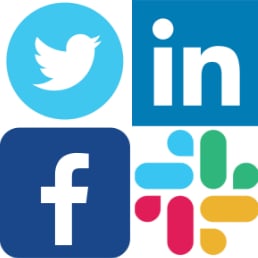...
How would you like to be a Guest Blogger for KMI? Email us at: info@kminstitute.org and let us know your topic(s)!
Before Knowledge Management and Working Out Loud - The Practice of Civility
 If you ask 100 Knowledge Management experts how to effectively implement and practice KM, you really do get close to 100 different answers. I believe this is because there isn’t one right answer. I believe that we should consider that before we go into looking at maturity models and k-strategies that we must attend to and address how people in our organization feel and how we engage with each other. A few weeks ago I had the pleasure of meeting John Stepper. John has written about ways to help people work and share knowledge by helping us understand that we each have a personal responsibility to help each other. At the core of John’s message lives a theme around choice. We have a choice on how we behave and respond to others. We have a choice to help others and share our knowledge. Here is a link to John’s blog.
If you ask 100 Knowledge Management experts how to effectively implement and practice KM, you really do get close to 100 different answers. I believe this is because there isn’t one right answer. I believe that we should consider that before we go into looking at maturity models and k-strategies that we must attend to and address how people in our organization feel and how we engage with each other. A few weeks ago I had the pleasure of meeting John Stepper. John has written about ways to help people work and share knowledge by helping us understand that we each have a personal responsibility to help each other. At the core of John’s message lives a theme around choice. We have a choice on how we behave and respond to others. We have a choice to help others and share our knowledge. Here is a link to John’s blog.
So now, when someone asks me “What’s Working Out Loud”?, here’s what I say:
“Working Out Loud starts with making your work visible in such a way that it might help others. When you do that – when you work in a more open, connected way – you can build a purposeful network that makes you more effective and provides access to more opportunities.”
Making your work visible: As Bryce described, this is indeed the fundamental starting point for working out loud.
Making work better: One of the main reasons for openly narrating your work is to find ways to improve it. You’re publishing so other people will see it, including some who can provide useful feedback, connections, or other things that will make your work better.
Leading with generosity: By framing your posts as contributions – as opposed to, say, efforts at self-promotion or personal branding – you’re more likely to engage other people. You’re not just looking for help but offering to help others, too. As Keith Ferrazzi said, “The currency of real networking is not greed but generosity.”
Building a social network: As you work out loud over time, you’ll be interacting with a broader range of people. The further you develop relationships with people in your network, the more likely it will be that you’ll collaborate with them and that they’ll be willing help you in other ways.
Making it all purposeful: Finally, since there’s an infinite amount of contributing and connecting you can do, you need to make it purposeful in order to be effective. (Goals might be as simple as “I want more recognition in my firm.” or “I’d like to explore opportunities in another industry or location.”) You can still have plenty of room for serendipity, but having a goal in mind focuses your learning, your publishing, and your connections.
Starting with Respect
Author: Barbara Richman
Organization: HR Mpact states
If each employee develops an awareness of respectful behaviors and necessary skills, it is anticipated that employees will serve as role models and that these behaviors will spread in the workplace and beyond. The following are ten tips to assist you in accomplishing this objective:
- Before acting, consider the impact of your words and actions on others.
- Create an inclusive work environment. Only by recognizing and respecting individual differences and qualities can your organization fully realize its potential.
- Self-monitor the respect that you display in all areas of your communications, including verbal, body language, and listening.
- Understand your triggers or “hot buttons.” Knowing what makes you angry and frustrated enables you to manage your reactions and respond in a more appropriate manner.
- Take responsibility for your actions and practice self-restraint and anger management skills in responding to potential conflicts.
- Adopt a positive and solution-driven approach in resolving conflicts.
- Rely on facts rather than assumptions. Gather relevant facts, especially before acting on assumptions that can damage relationships.
- Include others in your focus by considering their needs and avoiding the perception that you view yourself as the “center of the universe.”
- View today’s difficult situations from a broader (big picture) and more realistic perspective by considering what they mean in the overall scheme of things.
- “Each one influence one” by becoming a bridge builder and role model for civility and respect. Act in a manner whereby you respect yourself, demonstrate respect for others, and take advantage of every opportunity to be proactive in promoting civility and respect in your workplace.
http://www.lorman.com/resources/ten-tips-for-creating-respect-and-civili...
There is a saying that we only have one chance for a first impression. I believe this is true but I don’t think it stops there. Even if we made a good first impression, our relationship and interaction depends on what we do next. All of the listed behaviors above can only be effective if we make a choice. Choosing to behave as indicated takes a lot of energy. In order to practically apply these behaviors, we must first realize that there is a cost upfront. I haven’t read anywhere about this but I have experienced it. Just because you make a choice to be civil doesn’t mean that people around you will make the same choice. I have found in my own experience that have to spend time explaining to people why I am choosing to behave or respond to them in a certain way. It does amaze me sometimes that it appears we have lost something of ourselves due to different forms of psychological distance Our relationships have become more abstract and how we interact with others is less personal and more disconnected. If we look at each other through the lens of an Iphone or email, we as people become something less than a person. As we continue to move in the next generation of electronic connectedness, we are allowing our human connectedness to slip away. One example may be the commodity based or flexible workforce. Why do I want or need to know Howie if he will only be here for a short time? Another aspect is that we as workers have a clear affirmation that we are only a line item on a spreadsheet.
The Connection
If we are simply a line item on a spreadsheet why does any of this matter?
Have you ever used http://www.ancestry.com/? I went to the library a few months ago and looked up people from my family history. The only thing I could find was their names on a list. It was a handwritten list from the census. I could barely read the handwriting but I could see the names of my great grandparents or so I thought. The generations that came before me are not even known to me and the people who are closest in terms of generation are just names on a list. At the end of the day, we are really names on a list. If we allow that to rule over us and govern our behavior, we close the door to our experiences in the moment. The connection is that we have a choice and it goes back to John Stepper. We can choose to keep information to ourselves hoping that hoarding will help us personally or we can recognize that we are part of something bigger. We are part of a network and we are connected to each other in ways that we can only discover through sharing and openness. Our knowledge strategies must include an understanding and practice in sharing behaviors. Our underlying objective should be that we become so good at sharing that there is no need for people to help facilitate sharing activities in that it happens naturally. At the end of the day we all share a common end but we have a choice on how we behave and how we feel along the way.
Final Thought
A recent PBS documentary called This Emotional Life talks about happiness. Something to consider based on the research is that approximately 50% of our happiness comes from our genetics, 10% comes from environment and 40% comes from choice. What this means to me is that if we choose to respect each other and we choose to be kind and we choose to share and we choose to be happy, the moments of our lives will be rich and overall more pleasurable and full.
Before you go … please take a look at this (Happy)
Howard Cohen is the VP for Strategy & KM at Chubb Insurance. His focus on developing and maintaining a knowledge management strategy and manage the processes to collect, author and deliver content to the IT organization while working across the organization to help develop the organizational strategy around managing intellectual capital. He publishes frequently on LinkedIn and his own blog at: http://cohenovate.com/
Archives
- April 2024 (4)
- March 2024 (4)
- February 2024 (4)
- January 2024 (3)
- December 2023 (2)
- November 2023 (2)
- October 2023 (3)
- September 2023 (3)
- August 2023 (6)
- July 2023 (4)













